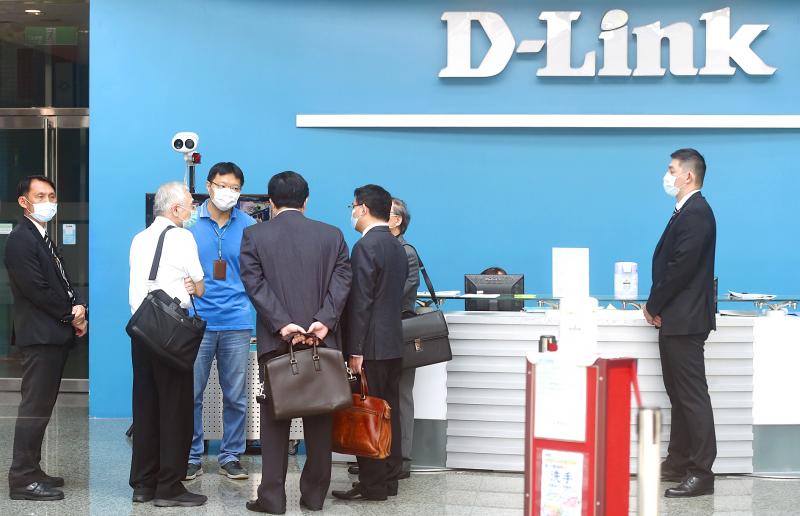Former D-Link Corp (友訊科技) chairman John Lee (李中旺) is to resume his post at the company, replacing Lori Hu (胡雪), after a special shareholders’ meeting in Taipei yesterday voted to reinstate him.
Convened by two independent members of D-Link’s board of directors — Chung Shyang-fong (鍾祥鳳) and Fong Chung-peng (馮忠鵬) — the meeting resulted in the dismissal of Hu along with five other members, with more than 70 percent of votes in favor of the move.
Lee was also elected as the company’s new chairman.

Photo: Chien Jung-fong, Taipei Times
Thanking shareholders for their support, Lee said he aims to stabilize the company’s management and resume operations as soon as possible before the next shareholders’ meeting due on June 15.
However, Lee was denied entry to D-Link headquarters later yesterday.
Accompanied by Chung, Fong and his lawyer, Lee was confronted by Hu’s son, Howard Kao (高宏毅), who blocked their way, insisting that Lee come back when D-Link’s registration with the Ministry of Economic Affairs’ Department of Commerce has been modified.
The developments followed reports of a management crisis at D-Link, with company executives and board members forming two opposing camps.
Aiming to turn the company around after continuous losses over the past few years, Lee, who previously served as chairman, vice chairman and chief executive officer at the company, earlier this year sought help from Taiwan Steel Group (台鋼).
However, his move was met with strong resistance from Hu, who sought an alliance with Qisda Corp (佳世達) via D-Link subsidiary Alpha Networks Inc (明泰科技).
Lee was last month dismissed from his chairman position at Alpha Networks and his vice chairman position at D-Link.
The power struggle for D-Link leadership between Lee and Hu, and the camps they belong to, culminated in a fine of NT$300,000 for the company.
The fine, levied last week by the Taiwan Stock Exchange (TWSE), came after D-Link’s board of directors decided to postpone a regular shareholders’ meeting in a bid to prevent a hostile takeover from Taiwan Steel.
Taiwan Steel has obtained a power of attorney by shareholders in its bid for control of D-Link with the support of Lee and other company executives.
Following an ultimatum by TWSE threatening to place D-Link’s shares in the altered trading method category, the company backtracked on its decision, reverting to the original date for the shareholders’ meeting.

In Italy’s storied gold-making hubs, jewelers are reworking their designs to trim gold content as they race to blunt the effect of record prices and appeal to shoppers watching their budgets. Gold prices hit a record high on Thursday, surging near US$5,600 an ounce, more than double a year ago as geopolitical concerns and jitters over trade pushed investors toward the safe-haven asset. The rally is putting undue pressure on small artisans as they face mounting demands from customers, including international brands, to produce cheaper items, from signature pieces to wedding rings, according to interviews with four independent jewelers in Italy’s main

Japanese Prime Minister Sanae Takaichi has talked up the benefits of a weaker yen in a campaign speech, adopting a tone at odds with her finance ministry, which has refused to rule out any options to counter excessive foreign exchange volatility. Takaichi later softened her stance, saying she did not have a preference for the yen’s direction. “People say the weak yen is bad right now, but for export industries, it’s a major opportunity,” Takaichi said on Saturday at a rally for Liberal Democratic Party candidate Daishiro Yamagiwa in Kanagawa Prefecture ahead of a snap election on Sunday. “Whether it’s selling food or

CONCERNS: Tech companies investing in AI businesses that purchase their products have raised questions among investors that they are artificially propping up demand Nvidia Corp chief executive officer Jensen Huang (黃仁勳) on Saturday said that the company would be participating in OpenAI’s latest funding round, describing it as potentially “the largest investment we’ve ever made.” “We will invest a great deal of money,” Huang told reporters while visiting Taipei. “I believe in OpenAI. The work that they do is incredible. They’re one of the most consequential companies of our time.” Huang did not say exactly how much Nvidia might contribute, but described the investment as “huge.” “Let Sam announce how much he’s going to raise — it’s for him to decide,” Huang said, referring to OpenAI

The global server market is expected to grow 12.8 percent annually this year, with artificial intelligence (AI) servers projected to account for 16.5 percent, driven by continued investment in AI infrastructure by major cloud service providers (CSPs), market researcher TrendForce Corp (集邦科技) said yesterday. Global AI server shipments this year are expected to increase 28 percent year-on-year to more than 2.7 million units, driven by sustained demand from CSPs and government sovereign cloud projects, TrendForce analyst Frank Kung (龔明德) told the Taipei Times. Demand for GPU-based AI servers, including Nvidia Corp’s GB and Vera Rubin rack systems, is expected to remain high,